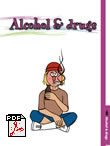- TOOL KITS
- A. The NEXT Step
- B. Promoting Independence
- C. Phone Apps
- D. Return to Work
- E. Motivational Interviewing
- F. Paediatric Brain Injury Rehabilitation Resources
- a) Introduction
- 0. Introduction
- 1. Transition
- 2. The transition wheel
- 3. Walking around the transition wheel
- 4. The transition wheel interview
- 5 . Using this kit
- 6 . Web resources
- b) Working together
- 7. My role
- 8 . My family's role
- 9. My case manager's role
- c) What can I do?
- 10. Who, where, what? The Services I receive
- 11. Accommodation
- 12. Driving
- 13.Alcohol and drugs
- 14. Social and recreational activities
- 15. Health and well-being
- 16. Relationships and friendships
- 17. Sexuality
- 18. Personal safety
- 19. Complaints/rights
- 20. Legal issues
- 21. Centrelink
- 22. Financial
- 23. Shopping
- 24. Employment, training and tertiary education
13. Alcohol and drugs
Alcohol and illegal drugs are chemical substances which effect how a person’s body functions. They are also considered toxins to the brain and could kill brain cells!
After a brain injury many people experience difficulties, these difficulties can get worse with alcohol and other drugs. Some of the ways alcohol and illegal drugs can affect people with brain injuries are listed below.
- Alcohol and drugs will affect you more quickly and have a more powerful affect on you after a brain injury. (You may find that only one beer will make you do or say things that you would normally not do!)
- Alcohol and other drugs can affect your co-ordination. If you have difficulties with this already you may find alcohol or drugs makes this worse. (That one beer may make it even harder to walk to the toilet!)
- Alcohol and drugs can affect your thinking, the control of your emotions and your behaviour. (Be careful that this does not place you in a position where you think you can take anyone on or that you end up telling everyone you love them!)
- Taking alcohol and drugs can increase the risk of having a seizure.
- Alcohol and other drugs can also interact with the medication that your doctor has prescribed for you. This interaction could lead to serious complications.
Peer pressure (that is the pressure from other people) can make it hard to say ‘NO’ to alcohol and drugs. You might be surprised that some people think that it is cool (and takes some courage) to say ‘NO’ and stand up to that pressure.
If you are thinking of taking some alcohol or drugs make sure you talk with your doctor first. Check with them if alcohol and other drugs will interact with your medication. The last thing you want is to end up back in hospital or to make a fool of yourself!
People to talk to
If you are worried about anything or have any questions about alcohol and drugs there are many people you can talk to:
Kids Help Line 1800 55 1800 (free phone call, available 24 hours a day)
Alcohol & Drug Information Service 1800 422 599 (free phone call, available 24 hours a day)
Lifeline 13 11 14 (available 24 hours a day)
Family Drug Support 1300 368 186
Or talk with your doctor


